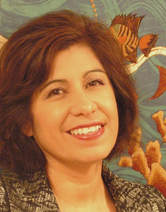My Approach in Therapy
When an adult or child enters therapy, it is often because relationships, work or personal behaviors, feelings and thoughts have become increasingly problematic. A therapist can help you navigate this thorny underpass of life. If you are reading this, perhaps you have already taken steps to make things better. And like the saying goes, a journey starts with a single step.
I think it's in our nature to persevere during difficult times. We have a natural ability to heal, grow and recover. My job is to help you connect with that part of self that will guide you forward. I don't candy coat reality. I look at the strengths and limitations that make us human, providing an experiential process that helps you find solutions. I can walk with you and/or your family toward a path of hope and healing by offering therapeutic services that are safe, confidential and focused on positive outcomes.
Understanding you -- knowing what you're about, what you want, and what is getting in the way of that -- is essential in building a working relationship that promotes results. To gain insight about your way of being, I consider you from a wholistic perspective. Through this thorough understanding, I can work with you to identify patterns of thoughts, behaviors and family dynamics that either lead you to healthy decisions or keep you trapped in a negative cycle. As we discuss the present, past and future, I may shine a spotlight on the terrain of your life to bring greater clarity and facilitate problem solving.
Therapy is known as the talking cure. And in the last decade, I have witnessed countless clients engage in the talking cure to transform their own lives. By exploring their inner self, they have resolved thorny work-life issues, and have moved forward in a manner consistent with their own needs, beliefs and values.
But I am mindful that it is your path -- your Trek. I am confident that your inner strength will provide you the resources needed to chart the course that is right for you at this point in time.
I hope to be a part of your journey.
I think it's in our nature to persevere during difficult times. We have a natural ability to heal, grow and recover. My job is to help you connect with that part of self that will guide you forward. I don't candy coat reality. I look at the strengths and limitations that make us human, providing an experiential process that helps you find solutions. I can walk with you and/or your family toward a path of hope and healing by offering therapeutic services that are safe, confidential and focused on positive outcomes.
Understanding you -- knowing what you're about, what you want, and what is getting in the way of that -- is essential in building a working relationship that promotes results. To gain insight about your way of being, I consider you from a wholistic perspective. Through this thorough understanding, I can work with you to identify patterns of thoughts, behaviors and family dynamics that either lead you to healthy decisions or keep you trapped in a negative cycle. As we discuss the present, past and future, I may shine a spotlight on the terrain of your life to bring greater clarity and facilitate problem solving.
Therapy is known as the talking cure. And in the last decade, I have witnessed countless clients engage in the talking cure to transform their own lives. By exploring their inner self, they have resolved thorny work-life issues, and have moved forward in a manner consistent with their own needs, beliefs and values.
But I am mindful that it is your path -- your Trek. I am confident that your inner strength will provide you the resources needed to chart the course that is right for you at this point in time.
I hope to be a part of your journey.
Qualifications & Experience
What is a Licensed Psychotherapist or LMFT?
Governed by the California Board of Behavioral Sciences, licensed psychotherapists and licensed marriage and family therapists (LMFTs) must meet specific educational requirements, receive qualified clinical training and adhere to high standards of professional conduct. They are required to have multiple years of educational and clinical experience. The training provides the expertise needed to assess, diagnose and treat individuals, couples, families and groups to achieve more fulfilling relationships or reduce pain and symptoms associated with mental health conditions.
Work Experience
Before I became a licensed therapist, I was a successful business professional, serving as an executive vice president. Today, I have traded in the life of a Starbucks-drinking, productivity-pushing, proposal-writing, strategic-positioning businesswoman for the ever-rewarding life of a psychotherapist living in the majestic Kern River Valley.
In my previous career, I worked in occupational health. This field examines how personal lifestyle, physical and mental health conditions affect a person's performance at work or school. The research in occupational health also demonstrates that the reverse is true. That is, work or school environment can equally affect a person's mental or physical health. This two-way relationship has direct implications on a person's daily functioning. With my expertise in occupational health and background in business, coupled with my clinical skills, I am able to uniquely understand a person from multiple perspectives. This wholistic approach allows me to see a person for more than just their problem, and is essential in opening up new doors of healing.
My post-graduate clinical training at Philips Graduate Institute, Olive Crest, Pacific Clinics and Hinze Chronic Pain Management Clinic has provided me with broad experience and knowledge regarding best practice treatment for trauma, depression, anxiety, family problems, anxiety, gender issues, substance abuse, social justice challenges, chronic pain, and pervasive mental health diseases. At these facilities, I received training on evidence-based practices by experienced clinicians and psychologists. In addition, I worked at Camp Erwin Owen in Kernville, treating hundreds of adolescent boys who had problems associated with mental health conditions, substance abuse, gang lifestyle, and family matters. I also helped these youth deal with systemic oppression and racial discrimination they experienced from community mental health agencies that lost touch with their needs.
Humanistic Treatment Instilled at Pepperdine University
As a magna cum laude graduate of Pepperdine University, I was fortunate to be educated by nationally-renown experts in mental health. These professors and clinical experts emphasized that psychotherapy is both a science and an art, and only by balancing these two realms can one deliver truly effective treatment. For instance, if a therapist is using the best available method to treat a problem, but lacks emotional connectivity, then there is a good chance that therapy will fall short of intended results.
Pepperdine instilled in me best practices that I use everyday in therapy. These practices include:
Specialities
I have extensive training and experience in treating emotional, physical, medical and sexual trauma, as well as PTSD, depression/anxiety. As a founding member of Pepperdine's Social Justice Organization, I have advocacy experience in helping clients learn how to manage adversity and inequality associated with racial, sexual orientation and gender discrimination or systemic oppression.
Governed by the California Board of Behavioral Sciences, licensed psychotherapists and licensed marriage and family therapists (LMFTs) must meet specific educational requirements, receive qualified clinical training and adhere to high standards of professional conduct. They are required to have multiple years of educational and clinical experience. The training provides the expertise needed to assess, diagnose and treat individuals, couples, families and groups to achieve more fulfilling relationships or reduce pain and symptoms associated with mental health conditions.
Work Experience
Before I became a licensed therapist, I was a successful business professional, serving as an executive vice president. Today, I have traded in the life of a Starbucks-drinking, productivity-pushing, proposal-writing, strategic-positioning businesswoman for the ever-rewarding life of a psychotherapist living in the majestic Kern River Valley.
In my previous career, I worked in occupational health. This field examines how personal lifestyle, physical and mental health conditions affect a person's performance at work or school. The research in occupational health also demonstrates that the reverse is true. That is, work or school environment can equally affect a person's mental or physical health. This two-way relationship has direct implications on a person's daily functioning. With my expertise in occupational health and background in business, coupled with my clinical skills, I am able to uniquely understand a person from multiple perspectives. This wholistic approach allows me to see a person for more than just their problem, and is essential in opening up new doors of healing.
My post-graduate clinical training at Philips Graduate Institute, Olive Crest, Pacific Clinics and Hinze Chronic Pain Management Clinic has provided me with broad experience and knowledge regarding best practice treatment for trauma, depression, anxiety, family problems, anxiety, gender issues, substance abuse, social justice challenges, chronic pain, and pervasive mental health diseases. At these facilities, I received training on evidence-based practices by experienced clinicians and psychologists. In addition, I worked at Camp Erwin Owen in Kernville, treating hundreds of adolescent boys who had problems associated with mental health conditions, substance abuse, gang lifestyle, and family matters. I also helped these youth deal with systemic oppression and racial discrimination they experienced from community mental health agencies that lost touch with their needs.
Humanistic Treatment Instilled at Pepperdine University
As a magna cum laude graduate of Pepperdine University, I was fortunate to be educated by nationally-renown experts in mental health. These professors and clinical experts emphasized that psychotherapy is both a science and an art, and only by balancing these two realms can one deliver truly effective treatment. For instance, if a therapist is using the best available method to treat a problem, but lacks emotional connectivity, then there is a good chance that therapy will fall short of intended results.
Pepperdine instilled in me best practices that I use everyday in therapy. These practices include:
- Conducting all therapy from a human-centric, strength-based model that offers positive, unconditional regard to clients
- Integrating a person's cultural background into the therapeutic process because language, religion, art/music, neighborhoods and socio-economic background can have a significant positive or negative impact on a person's functioning
- Applying evidence-based protocols to help clients reduce symptoms associated with mental health conditions
Specialities
I have extensive training and experience in treating emotional, physical, medical and sexual trauma, as well as PTSD, depression/anxiety. As a founding member of Pepperdine's Social Justice Organization, I have advocacy experience in helping clients learn how to manage adversity and inequality associated with racial, sexual orientation and gender discrimination or systemic oppression.


